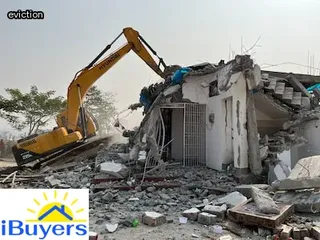The eviction process in Rhode Island is largely governed by state law, which dictates the procedures landlords must follow to legally remove a tenant from their property. Generally, before any action can be taken, a landlord must give written notice of their intention to evict and the reasons why.
Depending on the reason for eviction, this notice period may range from 10-30 days. Once the notice period has passed, if the tenant has not vacated or rectified the issue that led to eviction being sought, the landlord can then file an eviction complaint with their local court.
After filing, a summons will be issued, and both parties will appear in court to present their case before a judge makes a ruling. The judge's ruling will ultimately decide if the tenant is evicted or allowed to remain on premises, however it is important for tenants to note that there are certain defenses available under Rhode Island law that could prevent them from being evicted if proven in court.
Though navigating this process can be time consuming and stressful for both landlords and tenants alike, understanding and following Rhode Island's eviction laws is key in ensuring all parties involved are treated fairly.

The eviction process in Rhode Island is complex and can be difficult to navigate, so it's important to understand the different types of legal evictions that may occur. There are three primary types of evictions recognized in Rhode Island: Nonpayment of rent, breach of lease, and holdover.
If a tenant fails to pay their rent on time and does not remedy this within 10 days after receiving notice from the landlord, then a nonpayment eviction can be issued. Breach of lease occurs when a tenant violates the terms or conditions of their rental agreement, such as keeping pets when they're not allowed or having unauthorized people living in the unit.
Lastly, a holdover eviction occurs when tenants remain in the rental property after their lease has expired without permission from the landlord. Knowing these different types of legal evictions is crucial for anyone who rents in this state so they can protect themselves and avoid any potential issues.
Navigating the Rhode Island eviction process requires knowledge of the necessary steps. Firstly, a landlord must send an Eviction Notice to their tenant that specifies the reasons for eviction and informs them of their right to respond within ten days.
If a tenant doesn't respond within this timeframe, the landlord may file a court complaint in district court. At this point, the tenant will receive copies of the paperwork and will have another ten days to respond.
Otherwise, the landlord may apply for a Default Judgment from the court. Once all parties are present in court, the judge will decide if an eviction is warranted based on evidence presented by both sides.
The final step of this process is for either party to appeal any decision made by the judge in order to contest it further. These steps should be followed closely when navigating Rhode Island's eviction process in order to ensure that both tenants' and landlords' rights are being respected throughout.

When it comes to navigating the Rhode Island eviction process, understanding the documents used during an eviction is essential in order to protect yourself. Common documents used during an eviction include a notice to quit, which is a written notice informing a tenant that they must vacate their rental within a certain time frame; a dispossess notice, which is sent by a landlord when they have not received payment for rent; and an affidavit of service, which serves as proof that all necessary documents were served correctly and promptly.
The tenant may also be asked to provide other documentation such as proof of income or financial records. Additionally, issues such as unpaid bills or damage to property may require additional paperwork in order for the eviction process to be completed.
Understanding what documents are involved in the Rhode Island eviction process is key in helping tenants protect themselves while navigating through this difficult situation.
The eviction process can differ greatly from state to state. In Rhode Island, landlords must provide tenants with a written notice of eviction, detailing the reasons for the eviction and telling them when they must leave the premises.
This notice also includes information about their right to contest the eviction in court. The time frame for this notice varies; for most cases it is 10-30 days depending on the lease agreement.
After this period has elapsed, if the tenant does not vacate then the landlord may file an eviction lawsuit in court. Once a court order is given, it is up to law enforcement to enforce it.
If there are any disputes or delays at this stage, the landlord may need to pay additional fees and wait longer before they can regain possession of their property. Other states have different processes; some require more paperwork or allow tenants more time before they are legally required to vacate their home.
It is important for landlords to understand how each state's system works so that they can prepare accordingly when evicting a tenant.

In Rhode Island, tenants can be legally evicted in certain circumstances. These include being behind on rent payments, damaging the property, violating terms of the lease agreement, engaging in illegal activities, or creating a nuisance by making noise or hosting disruptive guests.
Landlords have the right to evict tenants who are endangering other tenants' safety and security as well as engaging in behavior that could result in significant financial loss for their landlord. Tenants may also be evicted if they fail to vacate the property after their lease has expired or been terminated by either party.
In all cases, landlords must follow the legal process of eviction that is outlined by Rhode Island law and provide written notice to their tenant before any action is taken.
Filing an eviction complaint with the court is a critical step in the Rhode Island eviction process. The landlord must first provide the tenant with a written notice to terminate the tenancy, and if they still refuse to vacate, the landlord may proceed with filing an eviction complaint.
The complaint must be filed in the Superior Court of Rhode Island in the county where the rental property is located. The complaint should include all relevant information about both parties, including names, addresses, and reasons for termination.
The landlord must then pay all applicable filing fees and serve copies of the complaint on all tenants listed in it. Once served, tenants have 10 days to file an answer to the complaint; otherwise, a default judgment will be entered against them.
It is important for landlords to ensure that all steps are completed correctly when filing an eviction complaint with the court as any errors or omissions can delay or even invalidate proceedings.

When a landlord decides to file for an eviction in Rhode Island, it is important that they notify the tenant of their rights and responsibilities. This notification should include information about their right to challenge the eviction, their obligation to pay rent, and any other terms or conditions outlined in the lease agreement.
It should also clarify when the tenant must vacate the premises and explain the consequences if they fail to comply with this timeline. In addition, the notice should describe how the tenant can access legal assistance or dispute resolution services if applicable.
Finally, it is important for both parties to understand that failure to abide by these rules can result in a court-ordered eviction or financial penalties for either party.
The first step in the Rhode Island eviction process is serving an official notice and demand to comply or leave. This notice must be served by a constable or sheriff, who will make sure that it is delivered according to state law.
After delivery of the notice, tenants have fifteen days to either comply with the terms of their lease or vacate the premises. If they fail to do so after that time, landlords can then begin the formal eviction process by filing a complaint with a local court.
It's important for both landlords and tenants to understand their rights and responsibilities during this process, as well as how it should be handled in accordance with Rhode Island law.

When a tenant fails to comply with the terms of their lease agreement or refuses to leave the property, landlords may seek possession of the rental unit. In Rhode Island, this process is known as an eviction and can be time consuming and complicated due to state regulations that must be followed.
The landlord must first file a special type of lawsuit called a Forcible Entry and Detainer Action in the district court that has jurisdiction over the area where the property is located. After filing this action, there are specific steps that must be taken by both parties in order for it to proceed, such as serving papers to the tenant with notice of the action and providing an opportunity for them to respond.
If a settlement is not reached during this stage, a hearing will be held in court where both sides can present evidence and make arguments regarding why possession should or should not be granted. Following the hearing, a judge will decide whether or not possession should be granted and if so, when it can take place.
During each step of this process, it is important for landlords to remain diligent in their efforts as failure to do so may result in additional delays or even dismissal of their case.
When it comes to navigating the Rhode Island eviction process, presenting evidence before the court is an important step. In particular, tenants must be prepared to provide proof that they have possession of the property in order to remain in their residence.
This could include a signed lease agreement or other written contracts that show legal possession of the property. Additionally, tenants should also bring any relevant evidence concerning their current situation such as payment receipts or documents proving that the tenant is up-to-date on their rent payments.
In some cases, it may also be necessary for a tenant to present witnesses who can attest to their right of possession of the property and any other circumstances surrounding the case. When preparing for this step in the eviction process, tenants must make sure that all evidence presented is accurate and verifiable in order to demonstrate strong legal ownership of their residence.

As a landlord in Rhode Island, it is important to understand your rights during the eviction process. All landlords have the right to evict tenants who breach the lease agreement or fail to pay rent.
Landlords must first provide written notice and wait for the tenant to either correct the issue or move out. For nonpayment of rent, a seven-day notice must be sent, while other violations require a thirty-day notice.
If tenants do not comply with the terms of the notice, landlords can proceed with an eviction hearing. During this process, landlords have the right to present evidence and testify in court.
In addition, landlords are also allowed access to their rental properties for inspections or repairs when necessary. Understanding these rights can make navigating the Rhode Island eviction process easier for landlords and ensure that their rights are protected throughout the process.
The potential penalties for illegally attempting to evict a tenant in Rhode Island are steep. Landlords must adhere to the state's laws and regulations when it comes to the eviction process, or else they can find themselves facing serious consequences.
Eviction proceedings initiated without a court order or through the use of physical force can result in fines of up to $5,000, imprisonment for up to one year, and civil damages awarded to the tenant. Additionally, if a landlord attempts to evict a tenant based on discriminatory practices or retaliatory motives, they may face additional criminal charges and fines as well as possible legal action from the tenant.
It is essential that landlords understand their rights and obligations under Rhode Island law before beginning an eviction procedure.

The eviction process in Rhode Island is complex, but there are resources available for free download that can help. The Rhode Island Judiciary Self-Help Center provides a number of useful documents, including a summary of the state's Landlord/Tenant laws and a step-by-step guide to the eviction process.
Additionally, the Department of Business Regulation offers several handbooks regarding tenant rights and responsibilities as well as landlord rights and responsibilities. These handbooks offer information on how to terminate a lease or tenancy agreement and outlines what to expect during the eviction hearing process.
Finally, the Housing Network of Rhode Island provides detailed information about affordable housing options in Rhode Island and assists tenants with finding legal assistance related to evictions. With these free resources, navigating the complicated eviction process in Rhode Island can be made easier.
Navigating Rhode Island's eviction process can be a complicated and lengthy ordeal. Fortunately, there are alternative avenues to explore when it comes to resolving disputes without having to go through the traditional court-based system.
Arbitration and mediation are two possible options that tenants should consider. Arbitration involves bringing in a neutral third-party to hear both sides of the issue and make a binding decision.
Mediation, on the other hand, is less formal and involves an impartial mediator helping both parties come to an agreement that is mutually beneficial for all involved. Both methods can save time, money, and stress associated with court proceedings while still providing tenants with the opportunity to resolve their issues quickly and fairly.
Additionally, many apartments complexes offer dispute resolution programs that can be used instead of going through the court system as well. These programs typically provide tenants with support from a certified housing counselor who can help them understand their rights as renters and work through their dispute in a timely manner.
Ultimately, exploring alternatives to the traditional court-based process for resolving disputes can help tenants navigate Rhode Island's eviction process more efficiently and effectively.

When calculating how long it takes to complete an eviction process in Rhode Island, it is important to understand that the process can vary depending on the situation. It is essential to review local laws for any special considerations when pursuing an eviction, as these may affect the timeline of your case.
Furthermore, it is important to protect yourself from retaliation when trying to legally remove a tenant. This can be done by requesting a demo from an experienced attorney regarding your specific situation.
Additionally, it is beneficial to understand what is contained in your official notice of eviction and all related documents so you are prepared for each step of the process.
In Rhode Island, landlords must adhere to specific rules when evicting a tenant. The landlord must provide a written notice stating the reason for eviction and the amount of time given to the tenant to vacate the property.
If the tenant does not leave before the allotted time, then the landlord must file an eviction complaint with the court. The court will review all evidence provided by both parties and render a decision based on Rhode Island's laws governing tenancy and eviction proceedings.
The court may order immediate possession of the property or provide additional time to tenants while giving them a chance to dispute any claims made against them by their landlord. If a tenant is evicted, they have up to 10 days after receiving notice of such action to file an appeal in order to avoid being removed from their residence.
In any case, landlords are also responsible for providing a reasonable relocation assistance package if they evict tenants who are elderly, disabled, or families with children. It is important that both landlords and tenants understand and abide by all relevant laws when navigating through an eviction process in Rhode Island.

Delaying an eviction in Rhode Island can be difficult, but there are several steps you can take. First, discuss the situation with your landlord.
Explain why you cannot pay the rent and ask for a payment plan or other type of relief. If the landlord agrees to a payment plan, be sure to get it in writing and make all payments on time.
You may also be entitled to receive financial assistance from local organizations that provide legal aid or rental assistance programs. Additionally, you may be able to file for a stay of execution with the court if you have an income-based defense or valid objection to a summary process summons or complaint.
Lastly, Rhode Island law allows tenants to apply for mediation services if they are facing eviction. This service is designed to help both landlords and tenants resolve disputes without going through court proceedings.
Eviction proceedings in Rhode Island can be a long and stressful process. Knowing how long an eviction remains on your record is essential to understanding the ramifications of the process.
In Rhode Island, an eviction stays on a tenant’s record for up to 10 years. This means that a potential landlord or other housing provider may be able to see that you have been through an eviction process in the past decade when you apply for housing.
While this may make it more difficult to find housing, there are steps tenants can take to mitigate their risk of being denied rental opportunities due to their eviction history.
In Rhode Island, landlords are legally required to issue a 30 day notice to vacate for a tenant before evicting them. This notice informs tenants that they must leave the property within 30 days or face legal action.
The 30 day notice must be in writing and must include the date when it was issued, the reason for eviction, and the date by which the tenant needs to vacate. In addition, it should explain that if the tenant does not comply, then the landlord has the right to take further legal steps in order to regain possession of their property.
It is important for tenants to understand their rights and responsibilities under Rhode Island law when it comes to receiving a 30 Day Notice To Vacate- as failure to comply could result in an eviction process.
A: The eviction process in the State of Rhode Island can take anywhere from 30-90 days depending on the circumstances.
A: The eviction process in Rhode Island typically takes between 30 and 90 days. When a renter is served an eviction notice, they must comply with the terms of their lease agreement or else face further legal action from their landlord. It is important for renters to understand their rights under landlord-tenant law to ensure they are not unfairly evicted.

A: The length of the eviction process in Rhode Island can vary depending on how quickly both parties reach an agreement. Generally, if the landlord and tenant enter into mediation, the eviction process can be completed in a few weeks.
A: Generally, the eviction process can take between two to four weeks from start to finish, depending on how quickly all parties involved respond.
A: The eviction process in Rhode Island can take anywhere from two to six months, depending on the situation and the timeline of the foreclosure.

A: According to the Rhode Island Landlord-Tenant Law, the landlord must send the tenant a written notice via mail at least 14 days prior to beginning the eviction process. The landlord then has to file a complaint with the court and obtain an order of possession before proceeding with any additional steps. If all necessary documents are properly filled out and filed, then the entire process can take 30-45 days from when the initial eviction notice is mailed.
A: The length of an eviction process in Rhode Island to collect actual damages from a tenant's bank account depends on the specific circumstances of the case, but it can typically take anywhere from one to three months.
A: The eviction process in Rhode Island typically takes between seven to twenty-one days, depending on the type of lease agreement and any violations or material breaches committed by the tenant. The landlord must follow all applicable state laws and regulations when proceeding with an eviction.

A: The length of an eviction process in Rhode Island after a court trial and the decision of a judicial officer can vary depending on the particular circumstances. Generally, however, it is estimated that the entire process may take anywhere between 1 to 3 months.
A: Navigating the Rhode Island Eviction Process, What You Need To Know - Typically, the eviction process takes between 1-3 months in Rhode Island beginning with the service of a Notice to Quit. The length of time depends on how quickly the court proceedings progress and whether the tenant appears at court hearings.
A: After the landlord has received a Writ of Execution, the eviction process typically takes between 14 and 21 days to be completed in Rhode Island.